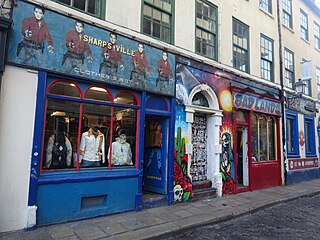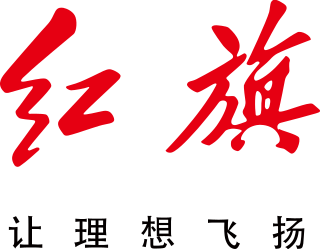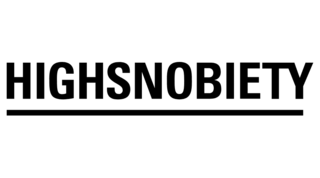
Fashion is a term used interchangeably to describe the creation of clothing, footwear, accessories, cosmetics, and jewellery of different cultural aesthetics and their mix and match into outfits that depict distinctive ways of dressing as signifiers of social status, self-expression, and group belonging. As a multifaceted term, fashion describes an industry, styles, aesthetics, and trends.

Consumerism is a social and economic order in which the goals of many individuals include the acquisition of goods and services beyond those that are necessary for survival or for traditional displays of status. Consumerism has historically existed in many societies, with modern consumerism originating in Western Europe before the Industrial Revolution and becoming widespread around 1900. In 1899, a book on consumerism published by Thorstein Veblen, called The Theory of the Leisure Class, examined the widespread values and economic institutions emerging along with the widespread "leisure time" at the beginning of the 20th century. In it, Veblen "views the activities and spending habits of this leisure class in terms of conspicuous and vicarious consumption and waste. Both relate to the display of status and not to functionality or usefulness."

In sociology and in economics, the term conspicuous consumption describes and explains the consumer practice of buying and using goods of a higher quality, price, or in greater quantity than practical. In 1899, the sociologist Thorstein Veblen coined the term conspicuous consumption to explain the spending of money on and the acquiring of luxury commodities specifically as a public display of economic power—the income and the accumulated wealth—of the buyer. To the conspicuous consumer, the public display of discretionary income is an economic means of either attaining or of maintaining a given social status.
The trickle-down effect is a model of product adoption in marketing that affects many consumer goods and services.

In economics, a luxury good is a good for which demand increases more than what is proportional as income rises, so that expenditures on the good become a more significant proportion of overall spending. Luxury goods are in contrast to necessity goods, where demand increases proportionally less than income. Luxury goods is often used synonymously with superior goods.

Thrift store chic refers to a style of dressing where clothes are cheap and/or used. Clothes are often bought from thrift stores such as the Salvation Army, Goodwill, or Value Village. Originally popular among the hippies of the late 1960s, this fashion movement resurfaced during the mid-1980s among teenagers, and expanded into the 1990s with the growing popularity of such music and style influences including the grunge band Nirvana. Thrift store chic can be considered as an anti-fashion statement because it does not follow fashion trends and does not attempt to look expensive or new.

The Millionaire Next Door: The Surprising Secrets of America's Wealthy (ISBN 0-671-01520-6) is a 1996 book by Thomas J. Stanley and William D. Danko. The book is a compilation of research done by the two authors in the profiles of American millionaires.

Frugality is the quality of being frugal, sparing, thrifty, prudent, or economical in the consumption of resources such as food, time or money, and avoiding waste, lavishness or extravagance.

Vintage clothing is a generic term for garments originating from a previous era, as recent as the 1990s. The term can also be applied in reference to second-hand retail outlets, e.g. in vintage clothing store. While the concept originated during World War I as a response to textile shortages, vintage dressing encompasses choosing accessories, mixing vintage garments with new, as well as creating an ensemble of various styles and periods. Vintage clothes typically sell at low prices for high-end name brands.
Ghetto fabulous is a lifestyle expression that originated among African American communities living in poor urban areas.
Paninaro was a social phenomenon in Northern Italy during the 1980s that was characterized by an obsession with designer clothing and adherence to a lifestyle based on luxury consumption. It began in the Milanese metropolitan area, later spreading throughout continental Italy. The phenomenon led to the creation of magazines, films and television programs.

Fast fashion is the business model of replicating recent catwalk trends and high-fashion designs, mass-producing them at a low cost, and bringing them to retail quickly while demand is at its highest. The term fast fashion is also used generically to describe the products of this business model. Retailers who employ the fast fashion strategy include Primark, H&M, Shein, and Zara, all of which have become large multinationals by driving high turnover of inexpensive seasonal and trendy clothing that appeals to fashion-conscious consumers.

Phoebe Philo OBE is an English fashion designer. She was the creative director of fashion brands Céline from 2008 to 2017 and Chloé from 2001 to 2006. Her eponymous line launched in 2023.

Hongqi is a Chinese luxury car brand operated owned by the automaker FAW Group. Hongqi was launched in 1958, making it the oldest Chinese passenger car brand. In Chinese, hongqi means "red flag."
Fuerdai is a Chinese term for the children of the nouveau riche in China. This term, generally considered pejorative, is often invoked in the Chinese media and everyday discussions in mainland China as it incorporates some of the social and moral problems associated with modern Chinese society.

Luxury and specialty packaging is the design, research, development, and manufacturing of packaging, displays, and for luxury brands. The packaging of a luxury product is part of the brand’s image and research shows consumers are willing to spend more on products if the packaging looks appealing and luxurious.

Highsnobiety is a global fashion and lifestyle media brand founded in 2005 by David Fischer. It was bought by German e-commerce giant Zalando in 2022. Highsnobiety is headquartered in Berlin and has offices in Amsterdam, London, Milan, New York, Los Angeles and Sydney.

Lifestyle creep, also known as lifestyle inflation, is a phenomenon that occurs when as more resources are spent towards standard of living, former luxuries become perceived necessities.

"Bobo Brand" is an informal name used to refer to a product that is sold inexpensively under an unpopular brand name. These products are perceived as inferior to better-known brands. Though they are less expensive, they are often not lower quality.
A luxury belief is an idea or opinion that confers status on the upper class at little cost, while often inflicting costs on the lower class. The term is often associated with the phenomena where privileged individuals, often disconnected from the lived experiences of impoverished and marginalized people, hold political and social beliefs that signal their elite status, yet impose consequences on those with the least influence.















